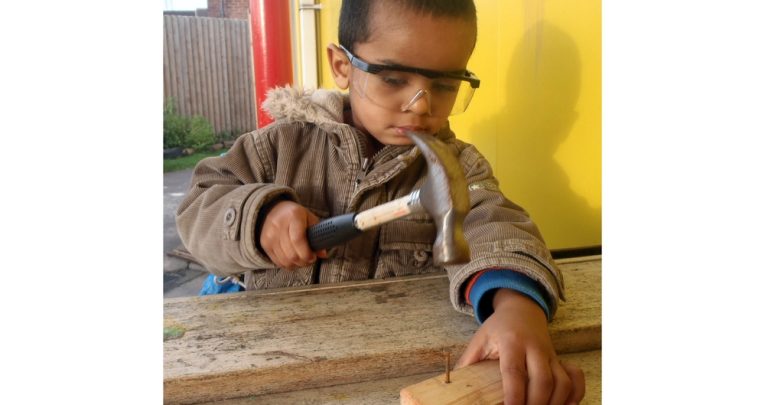‘Children Should Have A Great Deal Of Freedom To Learn In Ways That Are Uniquely Suited To Them’

Embracing child-initiated play can deliver huge benefits to learning – so make sure your setting is set up to make the most of it, says Anna Ephgrave…

- by Anna Ephgrave
- Early years consultant, author and former assistant headteacher Visit website

Child-initiated play – where children choose where to go, which resources to use, what to do with them and for how long – leads to deep levels of involvement, indicating increased brain activity.
We need to organise our settings to support this type of play, adjusting the physical environment, resources, timetable and rules.
Here are some tips, based on practice at Carterhatch Infant School, to help you make the changes you need to allow children to lead their learning…
1 | Organise free flow
If possible, have your doors open to outside from the moment the children arrive. Some children will only be able to get deeply engaged outdoors and therefore they need to be able to get outside immediately.
Plastic strips in the doorways can help keep the cold out of the classroom. If your doors are closed for the first part of your session, ask why and see if you can find a way to change this. If the doors are open all the time, there is no ‘mad rush’ to get outside – some children will go out and others will stay indoors.
2 | Minimise interruptions
In this way the children are able to pursue their chosen activity for as long as they wish.
Common interruptions might be PE lessons (which won’t be necessary if your environment is good enough); assembly (which can be avoided if you comply with the legal requirement within your classroom); playtime (which is often more for the adults to have a break than for any benefit to the children) or snack-time (which can be avoided by having a ‘snack bar’ available for the children to access as and when they wish); and focus activities.
Levels of involvement at focus activities are often very low, indicating minimal learning. Also while adults are doing focus activities, they are not able to interact with – ie teach – the children who are initiating their own play.
3 | Set up a workshop outdoors
This means that all resources should be available and accessible to the children, but there are no pre-defined learning objectives or activities.
At Carterhatch, the resources are carefully selected to be open-ended and can be used in numerous different ways. The resources outdoors are different to those on offer indoors – we can be louder, messier and bigger outdoors.
Thus we have mud, instruments and large blocks. There are also items to enhance gross motor development, such as ropes and monkey bars.
4 | Set up a workshop indoors
Again all resources are available and accessible to the children, but nothing is set out – there are no preplanned activities or outcomes. Therefore the tables, sand tray, water tray and carpet areas are empty when the children arrive, but all resources are organised and arranged on appropriate shelving nearby.
5 | Allow risk-taking
A ‘risk’ is taken every time a child does something for the first time and at such moments, the child’s brain is at its most active – struggling to get to grips with this new learning.
Children do not want to be bored and will look for things that are challenging, interesting, difficult and exciting. We don’t need to be continually ‘challenging’ them – in the right environment with a supportive atmosphere, they will challenge themselves. If a setting is too ‘safe’, the children become bored and they will start to look for other ways to be engaged – doing things that they should not be doing. This is often when behaviour problems emerge. Woodwork is a superb example of something that is ‘risky’ yet delivers deep levels of involvement and fantastic learning.
6 | Boundaries and expectations
I am advocating that children should have a great deal of freedom to learn in ways that are uniquely suited to them.
However, young children need clear boundaries and rules that are consistently applied, as this gives them a sense of security, allowing them to relax and become engaged. Children do not thrive in chaos, when rules keep changing or when rules differ from one adult to the next.
In our school, there are a few rules and they are consistently applied by all adults:
- When we have finished with something, we put it away
- Indoors we walk and use quiet voices.
- No one touches anyone when climbing.
- We use our words (to resolve disputes).
7 | Go to the children
Our adults never call children to them. Experience has taught us that by going to them, we are able to find out what engages them and see them operating at their limits. Children will persevere and challenge themselves if it is something that they have chosen to do.
By observing children in these scenarios, we are really getting to know each unique child, their interests, dispositions and abilities.
8 | Choose your moment
A skilful adult knows when and how to get involved in children’s play. They are able to spot the moment when they can add something to enhance the learning for the child – ie they look for ‘teachable moments’.
Equally important is being able to recognise when children will benefit from being left to struggle or negotiate without adult support. Their success in such situations means that they will develop resilience and independence.
9 | View interactions as teaching
If adults do decide to interact with the children as they play, they need to consider the impact that they have. These interactions are ‘teaching’ in its most powerful form.
It is estimated that an early years practitioner has about 1,000 interactions per day. In each interaction there will be a moment when the practitioner decides what to do (this is planning in the moment) and their subsequent action is a moment of teaching leading to a tiny step of progress for the child.
The Ofsted definition of teaching lists the following examples – “Communicating and modelling language; showing; explaining; demonstrating; exploring ideas; encouraging; questioning; recalling; providing a narrative for what they are doing; facilitating and setting challenges”.
This are exactly the sort of things that adults should be doing during child-initiated play.
10 | Record later
It is not necessary or possible to record everything that happens. While practitioners are writing, they are not interacting and thus not supporting learning.
I therefore make a plea for practitioners to stop writing so much and start interacting more. It is your interactions that will have an impact on the children – not the notes that you write.
Also, while you are busy writing, the quality of the play might deteriorate if children encounter problems or obstacles and there is no adult available to support them.
Anna Ephgrave is assistant headteacher for early years at Carterhatch Infant School; for more information, visit carterhatchinfants.com.










